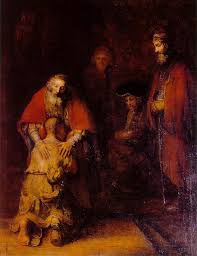
The Passion according to St. Luke shows us that nobody did what was right: neither Judas nor Peter, neither Pilate nor Herod, nor of course the Jews nor their leaders; nobody did right, except for one. Only Jesus followed His Father's will, even to death. And therefore He earned the right to ask forgiveness for all: "Father, forgive them, for they know not what they do." Such good news this is, because when we read the Passion Gospels, and participate, reading the parts of the crowd, or of those who did wrong, we can well relate to their wrongs, for we have sins of our own. And yet, since Jesus had earned the right to ask for this mercy, it has been granted, and your forgiveness has been obtained. The sermon.











